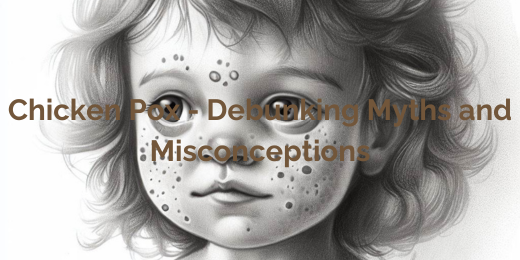Debunk Chicken Pox myths
The varicella-zoster virus is an infectious virus that causes chicken pox. Despite its common occurrence, it is surrounded by myths and misconceptions. These misconceptions can impact public perception and health decisions. Debunking Chicken Pox myths is essential to provide accurate information and promote informed decision-making. Some common myths include the belief that Chicken Pox only affects children and that the vaccine is unnecessary.
However, adults can also be affected, and scientific evidence supports the importance of vaccination. By addressing the prevalence and impact of these misconceptions, we can combat misinformation and promote a better understanding of Chicken Pox. Let us work together to debunk Chicken Pox myths and ensure accurate information reaches the public.
Myth 1: Chicken Pox only affects children
Chicken Pox myths often mislead the public, particularly the common misconception that it solely affects children. However, it is crucial to debunk this myth with facts and statistics. Contrary to popular belief, adults can also contract the virus, highlighting the importance of awareness and preventive measures for all age groups.
To debunk Chicken Pox myths, let us rely on concrete evidence. Research reveals that adults who have not had Chicken Pox are susceptible to the virus, which can lead to severe complications. Fortunately, the Chicken Pox vaccine has shown remarkable efficacy in preventing the disease and its associated risks.
By dispelling these myths, we can provide accurate information and enhance understanding of Chicken Pox across different age groups. Emphasizing the facts and statistics surrounding the virus enables individuals to make informed decisions and safeguard their health. Let’s join forces to debunk Chicken Pox myths and ensure everyone possesses reliable knowledge. Similarly, as we emphasize the importance of accurate information and dispelling Chicken Pox myths, practicing good personal hygiene contributes to reduced illness risk, improved self-esteem, and enhanced well-being.
Myth 2: Chicken Pox vaccine is unnecessary
In today’s world, understanding the significance of vaccination has never been more critical. Vaccines play a pivotal role in safeguarding public health by preventing the spread of infectious diseases. Addressing concerns that surround vaccination is equally important to promote informed decision-making. By providing scientific evidence, we can debunk Chicken Pox myths and reinforce the importance of immunization.
Numerous studies have proven that vaccines are safe and effective, significantly reducing the risk of severe complications and mortality associated with diseases like Chicken Pox. Vaccination not only protects individuals but also contributes to herd immunity, shielding those who cannot be vaccinated due to health conditions. Likewise, acknowledging the importance of the immune system and embracing vaccination can together fortify our resilience against diseases, fostering healthier communities and individual well-being.
Myth 3: Chicken Pox is a mild and harmless illness
When it comes to discussing Chicken Pox, it is crucial to shed light on the potential complications and risks associated with the disease. Contrary to misconceptions, Chicken Pox is not a harmless childhood ailment. Particularly in people that are already susceptible, it might cause serious difficulties. Varicella, the virus causing Chicken Pox, can result in pneumonia, skin infections, and even neurological issues.
By debunking Chicken Pox myths, we can correct the misconception that it is a trivial illness. Scientific evidence overwhelmingly supports the fact that Chicken Pox can have serious consequences. Vaccination emerges as a proactive measure to prevent such risks, significantly reducing the likelihood of severe complications. Let us embrace accurate information and make informed decisions to safeguard our health and that of our loved ones.
Myth 4: Chicken Pox is the same as Shingles
It is essential to differentiate between Chicken Pox and Shingles to dispel any misconceptions about their relationship. Chicken Pox and Shingles are both caused by the varicella-zoster virus, but they manifest in distinct ways. Chicken Pox primarily affects children, causing a widespread itchy rash and flu-like symptoms. However, the virus remains dormant in the body and can later reactivate as Shingles in adulthood. Debunking Chicken Pox myths is crucial to clarify that Shingles is not a direct result of exposure to someone with Chicken Pox.
Shingles is a separate condition, characterized by a painful rash and nerve-related complications. Vaccination against Chicken Pox not only prevents the disease itself but also reduces the risk of developing Shingles later in life. Understanding the differences and dispelling misconceptions empowers individuals to make informed decisions about prevention and care. Embracing the benefits of being mindful, such as reduced stress and improved focus, can also contribute to better overall well-being.
Conclusion
Let us summarize the myths and misconceptions surrounding Chicken Pox that have been successfully debunked through scientific evidence. Firstly, Chicken Pox is not a trivial childhood illness; it can lead to severe complications and pose risks to vulnerable individuals. Secondly, it is essential to differentiate between Chicken Pox and Shingles, as they are distinct conditions caused by the same virus.
Exposure to Chicken Pox does not directly result in Shingles. Now, armed with accurate information, we can emphasize the significance of Chicken Pox vaccination. Vaccination not only protects individuals from the disease but also contributes to the prevention of Shingles in adulthood. By spreading awareness and encouraging accurate information, we can ensure that everyone understands the importance of vaccination in safeguarding public health.



